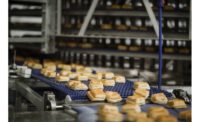About A Boy
By Deborah Cassell
As his official job title implies, Rich Labriola is more than just another CEO. Labriola Baking Co.’s “chief dough boy” is putting his Chicago company on the map with artisan breads that are truly Old World in spirit and style.
You can take the dough out of the boy, but you can’t take the boy out of the dough … or something like that. Just ask Rich Labriola. Upon first glance, it would appear that a certain fun-loving baking industry icon has taken over Rich’s office in Alsip, Ill. Every corner of the wide room is decorated with short, pudgy, kerchief- and chef’s hat-sporting Pillsbury Doughboys.
But don’t let the mascots fool you. Everyone knows that the “chief dough boy” at Labriola Baking Co. is Rich Labriola himself.
With a title like CDB — and an office full of Pillsbury memorabilia — it’s safe to assume that Rich isn’t your average baker. Some might say he’s still a kid at heart — especially after reading the Questions & Answers section of his company’s Web site, www.LabriolaBaking.com, where visitors can contact the Italian, Blue Island, Ill., native directly.
Online, Rich reveals that “Pee-wee’s Big Adventure” is his favorite movie and admits that “my maturity level has been tested at that of a 12-year-old.”
Just 10 years ago, Rich knew about as much about baking as he did as a kid. He couldn’t even knead dough or bake bread … and now he’s making plenty of both.
Initially, “we were nobody special because we really didn’t make anything that special,” Rich says. “Baking became a passion once I figured out how to do it.”
It’s that passion for Old World-style artisan breads that is making a name for Labriola in Chicago. Just what gives the bakery’s product that authentic look and taste? Attention to detail.
“We do things the way someone would do them with a 2,000-sq.-ft. shop,” Rich says. In reality, Labriola Baking’s Alsip plant measures 60,000 sq. ft. (See “Purists at Heart” for details.)
Rich plans to open a new facility of 80,000 to 100,000 sq. ft. in the near future. There, Labriola will continue to bake the baguettes, batards, ciabatta and other traditional loaves that consumers and foodservice customers have come to expect from the Italian baker.
To Rich, artisan bread is not a trend.
“It’s how we do things,” he says. True artisan bread doesn’t look like it came off an assembly line, he adds. At Labriola, every loaf, bun and roll is unique. And every flavor is distinct.
“That’s the difference between us and ‘them,’” Rich asserts. That said, he recognizes that his company can’t compete with bakers who consider bread a commodity.
“We’re going after a niche,” he explains.
Method Man
Although his father was in the pizza business, Rich chose not to follow suit.
“I was working there when I was, like, 10 years old,” he says.
As Rich later learned, “Usually, when you’re not trying to just make money, you end up finding something you like. I don’t like to sound like money isn’t important because, obviously, it is, but there’s a lot more money to be made making mediocre bread than there is making really good bread.”
Rich chose to do the latter. He first got the idea to open his own bakery after his uncle brought home some bread from a North Side bakery that didn’t have distribution in the south suburbs. While distributing the product, Rich saw an opportunity to do something more.
After reading some books and taking some classes about different baking methods at the National Baking Center in Minneapolis, Minn. and the San Francisco Baking Institute, Rich launched Labriola Baking Co. At the start, he didn’t even know the percentage of salt that went into the bread. The company’s baker at the time told him it took a tomato sauce can — the equivalent of 2%.
It took awhile for Labriola to perfect its artisan bread process. But after a lot of trial and error, the company finally got it right … and found that niche.
“You get to a point when something clicks,” Rich says. And it’s kept on clicking. “Our bread is as good if not better than it was five years ago,” he notes.
One of the most important lessons he’s learned over the last decade is that “there are so many ways to achieve the same thing,” Rich says. “People say if you give 10 bread bakers the same recipe, you’ll have 10 different loaves of bread.
“Our methods do not hold to French or Italian or German methods,” he continues. “No method is 100% perfect. We took each method and put our own twist on it.”
And for every loaf created through that method, there’s a consumer out there just waiting to tear into it.
A Better Bread Basket
Like tortilla chips in a Mexican restaurant, bread baskets in Italian, French and even American eateries have become standard fare. What’s inside them, thankfully, has not. For example, at Carmine’s in Chicago, bread baskets are filled with Labriola’s crusty artisan bread. Meanwhile, bread baskets at Chicago’s own Rosebud feature Labriola’s baguettes.
Lately, there has been a trend toward softer breads in baskets.
“Some people don’t necessarily like to battle that crust,” Rich explains.
Regardless of the texture, at most restaurants, he adds, “If someone’s paying attention to the bread and the coffee, then the meal will probably be good.” And Labriola’s bread gets a lot of attention.
The bakery also serves retailers, but in-store displays make up just 10% of its business. All in all, the company has 26 routes, as well as carriers and drop-shipments.
“Bread needs to get to customers as close to once it’s baked as possible,” says Rich, adding that ideally, bread should be delivered within 6-8 hours of baking. Labriola is devoted to doing just that.
And that’s one tall order. After all, Labriola offers more than 400 stock-keeping units of bread, with its top-sellers beings baguettes and sourdough. The baker makes three types of sourdough, including the San Francisco variety with which most Americans are familiar. (See “Sour Batch Kid.”) Every loaf of Labriola bread is all-natural, as well.
The baker even has begun offering organic products.
“Once we got the right flour, the rest took care of itself,” Rich says.
Whole grain products are next on Labriola’s hit list.
“If you do it right, you don’t have to add the extra sweetener,” asserts Rich, adding that honey is one such alternative.
Soft, sour, all-natural, organic, whole grain … the list of offerings goes on and on.
“We have so many products, it’s hard to fathom that there’s something out there that we don’t have,” Rich says.
And unlike some bakers, Labriola doesn’t rely on consumer panels and focus groups to approve its product offerings. Instead, the chief dough boy tastes and sees for himself.
“I think my palette represents what I think our customer likes,” Rich says. “I’m not a bread snob, but I know what I like. Usually if I like it, people end up loving it.
“When you taste something that’s done the way we do it, it’s almost like wine,” he adds. “You have more flavors in your mouth. Five minutes later, your mouth still feels sweet from the wheat. That’s what we’re going for. Anybody can put flavor in the crust, because the carmelization of the crust gives you flavor.”
And if anyone should know, it’s Rich.
He even has a favorite variety: pain au levain, a complex whole wheat and rye concoction that Rich calls one of the best Labriola bakes.
“A lot of people don’t understand it,” he says.
While his favorite bread might be complicated, it’s easy to see that Labriola’s chief dough boy has made an art out of artisan baking. And there’s no kidding around about that.
At a Glance
Company: Labriola Baking Co.
Headquarters: Alsip, Ill.
Annual sales: $19 million
Products: Italian and French artisan-style breads and desserts for retail and foodservice customers.
Plant size: 60,000 sq. ft.
No. of lines: Five
Web site: www.LabriolaBaking.com
KEY PERSONNEL
Chief Dough Boy/President/Owner: Rich Labriola
V.P. of Operations: Gina Errico
Director of Sales: Anthony Nardini
Production Director: Gerardo Villegas
Customer Service Manager: Lori Segreti
V.P. of Finance: Terry Dempsey
Accounting Manager: Stephanie Labriola
Purchasing Manager: Joe Orozco
Director of Maintenance: Dave Kolinski
Sanitation Manager: Juan Herrera
Ovens Manager: Rafel Mozo
Distribution Manager: Jorge Serna Route
‘Staff’ of Life
Where would Rich Labriola be without the support of his loyal employees? Certainly not in well-known Chicago institutions such as Carmine’s and Rosebud. It takes a village to raise a child … and a great staff to assist Labriola Baking Co.’s chief dough boy.
Gina Errico is second in command at the Alsip, Ill., facility, where she has worked for eight years. As vice president of operations, it is Errico’s job to run the bakery. And she does so with a smile. … as does everyone else at the bakery. The atmosphere at Labriola is far from stiff and structured. If new employees want to fit in, they can’t be obsessed with titles and job descriptions, Rich says.
“We’re definitely not corporate,” he adds. “We’re anti-corporate, actually.”
If Labriola Baking were the subject of a reality TV show, it would be “’The Real World meets ‘The Surreal Life’ meets ‘Survivor,’” he jokes.
“With a splash of ‘The Sopranos,’” Errico interjects.
Similarly, Rich describes Labriola’s marketing campaigns as “classy but fun.” For example, the baker recently decked out a sprinter van like the Partridge Family bus, complete with baguettes dressed as people. One loaf even sports a Cubs hat. Believe it or not, this South Sider is no White Sox fan. And although his employees might rib him on that point, it’s all in good fun.
Sour Batch Kid
At Labriola Baking Co., sourdough is far from stereotypical. Although most consumers are familiar with the San Francisco-style variety, the Alsip, Ill., bakery also produces a European sourdough that’s more mild and fruity than sharp.
Sourdough starters are different, explains Rich Labriola, the company’s “chief dough boy.” Everything from the temperature of the dough to the fermentation time differs, resulting in different flavors.
“It’s the method,” he says. “What I feel we’re good at is manipulating that process, bringing the sour starter through different temperature and time and refreshment zones to really build up all the sour — not just the flavor, but the aroma.”
Rich tells the story of a local man who wrote in saying that his 10-year-old son was allergic to yeast and didn’t like sourdough. Rich told him that there are all kinds of sourdough and “the ones we make are different than what you may have seen.
“So we sent some bread to his house … and his son liked the pain au levain,” he concludes. “In the end, we hopefully have a customer for life.”
Beyond Bread
In addition to producing more than 400 stock-keeping units of bread, Labriola Baking Co. a few years back began offering its foodservice customers about 250 SKUs of pastry items after buying a smaller dessert-making business. None of the cookies, muffins, cakes, Danish, tea breads and doughnuts contain additives or shelf extenders.



